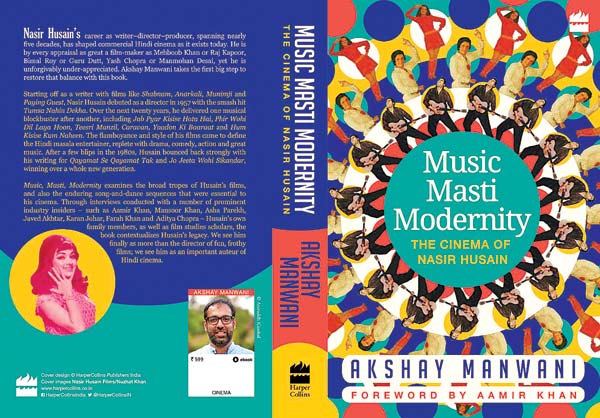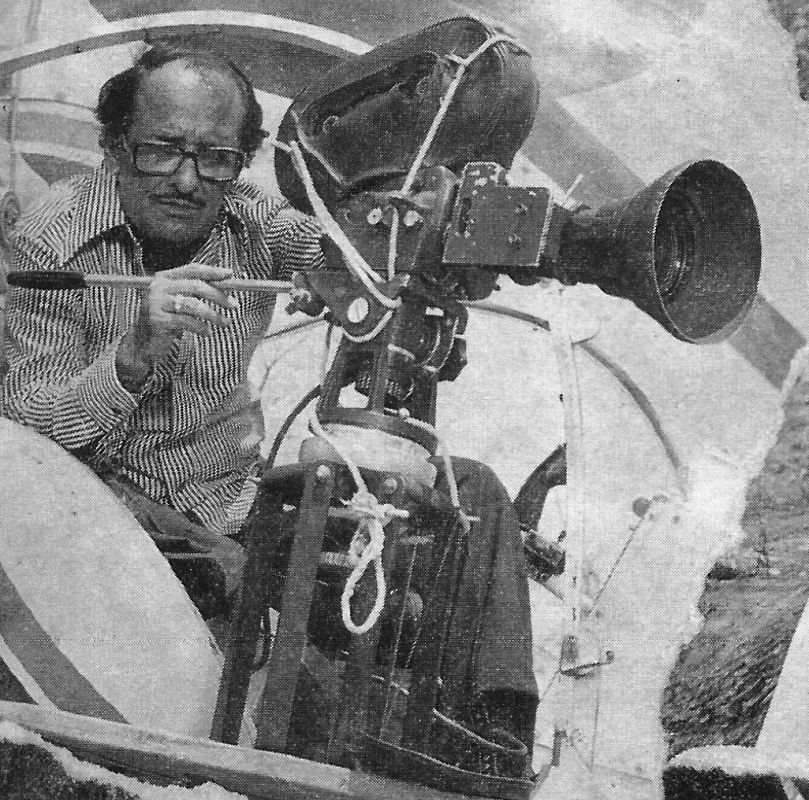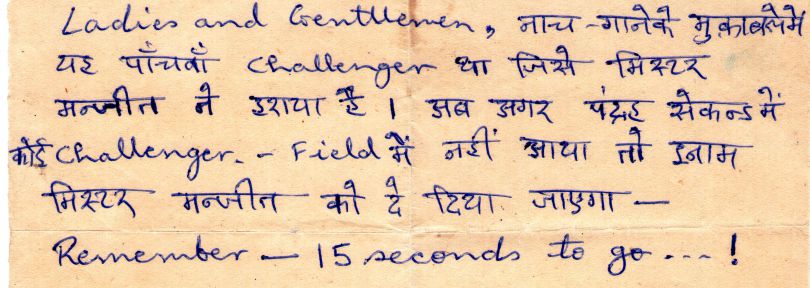|
|
||
|
Pro Tools
FILMFESTIVALS | 24/7 world wide coverageWelcome ! Enjoy the best of both worlds: Film & Festival News, exploring the best of the film festivals community. Launched in 1995, relentlessly connecting films to festivals, documenting and promoting festivals worldwide. Working on an upgrade soon. For collaboration, editorial contributions, or publicity, please send us an email here. User login |
Siraj Syed reviews ‘The Cinema of Nasir Hussain’, by Akshay Manwani
Siraj Syed reviews ‘The Cinema of Nasir Hussain’, by Akshay Manwani ...and serialises his own recollections of the Indian writer-director, who was a rare blend of pithy penmanship and shimmering showmanship. Nasir Hussain (1931-2002) wrote and co-wrote a string of hits for Filmistan Studios, developed the persona of Shammi Kapoor as the Rebel Star, provided the platform to composer Rahul Dev Burman for his first big banner hit, sustained his faith in lyricist Majrooh Sultanpuri’s ability to create narrative lyrical continuity on demand, gave slapstick comedian Rajindernath his best roles, teamed-up with writer duo Salim-Javed to create his (only) multi-starrer block-buster, paved the ground for the remarkable careers of his son Mansoor Khan, and nephew, Aamir Khan, even tried his hand at neo-realistic semi-melodrama, albeit with disastrous results. And yet, what did most film-writers think of him then, as many still do? “The writer who had only one story to tell; the wordsmith who could not think beyond lost and found sagas; the maker who’s films always had masquerading characters and revenge plots running through; the pen-pusher who loved mountains and balloons; the director who believed in over the top comedy; the film-maker to whom cinema was all about song and dance,” and so on. He is never spoken of in the same breath as Shakti Samanta, Pramod Chakravarti, Subodh Mukerji, Manmohan Desai, Prakash Mehra, all of who used the same or similar tropes, and as often and as unrealistically, if not more so. They were all contemporaries of, or just that bit junior to, Hussain, a bunch of highly successful directors, and some of their films were mini classics. But whatever happened to the man who made Tumsa Nahin Dekha, Dil Deke Dekho, Jab Pyar Kiseese Hota Hai, Phir Wohi Dil Laya Hoon, Caravan, Teesri Manzil, Yaadon Ki Baarat and Hum Kiseese Kum Naheen? “He was slave to a formula, a maker with no originality; a maker whose films clicked largely due to the songs, locales and the charisma of the lead actors.” Really? I saw Tumsa Nahin Dekha, Hussain’s debut as director, as a five year-old, and worked with Hussain on a few occasions, during 1972-80. We had several conversations in his office, and he even directed me in a few scenes (YKB, HKKN). During this period, cine-goers saw the best of his best, and also the beginning of his irreversible decline. I would be inclined to view any biography of Hussain as a process of discoveries, or negations, or both, like “Wow! I didn’t know that!” or, “No! That’s not true.” But guess what? This is not a biography, as biographies go.
Akshay Manwani graduated from St. Xavier’s College in 2000. He never met Hussain, who died in 2002. I assume he never met Majrooh or R.D. Burman either. So what is he doing here, writing about the cinema of Nasir Hussain? In the author’s words, “This book is not a biography that looks at Hussain’s personal life in great detail. Instead, it focusses essentially on Hussain’s cinematic craft.” No doubt about it, Akshay. However, such works are always in danger of becoming scholarly critiques or doctorate theses, often postulating, collecting quotes from several sources to further already set-out agendas. Music Masti Modernity: The Cinema of Nasir Hussain (Harper Collins, paperback, price; Rs. 599 in India, launched at the Mumbai Film Festival a few weeks ago, where I was given a review copy) does fall prey to the trap of eulogistic appraisal, backed by endorsements and validations, but balances it somewhat with a look at Hussain’s failures too. It would be unrealistic to expect an author of what is meant to be a tribute, to be blunt and unforgiving. In fact, Manwani has tapped a cross-section of sources, ranging from the extended Hussain family (Mansoor, Nuzhat, Aamir, Tariq) to other directors (Aditya Chopra, Karan Johar), script-writers (Javed Akhtar), authors, bloggers, analysts and a large chunk of archival anecdotes. Most of the material that emanates from these origins is worthy; some, as a professional hazard, is repetitive and generalised. Indeed, many of these similar strokes might have been avoided with crisper editing. At 402 pages, Music Masti Modernity: The Cinema of Nasir Hussain, is a just a wee bit too long, like almost all of Hussain’s films, beginning with Yaadon Ki Baaraat. You don’t mind that, so long as the pace is racy, as in the 70s work, but it does get a bit tedious when it comes to the 80s: Zamaane Ko Dikhana Hai, Manzil Manzil and Zabardast. If Qayamat Se Qayamat Tak and Jo Jeeta Wohi Sikandar are lengthy, blame it on the director-son, not on the writer-father. From Sahir Ludhianvi: The People’s Poet (published 2013), a socialist/communist to the core with a philosophy akin to the theme of Nasir Hussain’s biggest flop, Baharon Ke Sapne, to Nasir Hussain, the man identified with masala and formula concoctions to the film-making recipé, is quite a leap for Akshay Manwani, who took up journalistic writing in 2009. On the other hand, a film is a film, as a sport is a sport. Interestingly, Manwani is as keen about NBA as he is about cricket.
On his present subject, Manwani told a Mumbai daily, “Husain’s films reflect a certain Anglophone club culture that was omni-present in the hill-stations of India--be it Mussoorie, Darjeeling, Ooty--through the early-to-mid 20th century. His films, like Dil Deke Dekho, Jab Pyar Kisise Hota Hai and Teesri Manzil, all show the club space inhabited by a certain Indian elite class that do not have problems with such Western spaces or Western culture. His music for such club spaces in these films is all rock-n-roll and heavily influenced by what is happening in the West, but what is ultimately being consumed by a certain strata of the Indian elite in these hill stations, in the 1950s and 1960s.” Occasionally, the transliteration and translation of Urdu (a graduate in Urdu Literature, Economics and English from Lucknow University, and a resident of Bhopal, Nasir wrote in native Urdu) goes awry, but never so much as to put you off. There is a detailed filmography appended, as is a selected bibliography and handy index. Pictures, mostly in black and white, though few, are priceless. And there are surprises galore for lay film buff, like the fact that Nasir Hussain wrote the story of Anarkali, the screen version of Imtiaz Ali Taj’s 1922 play that was released by Filmistan a full seven years before its magnum opus big brother, Mughal-e-Azam, and that Zabardast was the name of a multi-starrer he had started, with Dilip Kumar in the central role, his most ambitious project and the only film that he had to shelve. (I attended the muhurt--launch ceremony) Rating: *** --------------------------------------------------------------------------------------------------------------------------------------------------------------------------------------- What I remember as the first image of a Nasir Hussain film featured Shammi Kapoor and Ameeta in Tumsa Nahin Dekha (1957), is not on a hill-station, but on a Filmistan Studios set. It was the Rex cinema in Mumbai, and the film is among the earliest two I can remember, the other being Do Ankhen Barah Haath (at Royal Opera House). Obviously, it was also my introduction to Shammi Kapoor and O.P. Nayyar (music director). Little did I know that, 30 years later, I would be speaking these lines in Hum Kiseese Kum Naheen, lines that Manwani quotes (thrice?) in the book, as symbolic of the song-dance competition-exhibtion cinema of Nasir Hussain, without identifying the actor who mouths them. The scan below is from the lines I penned in my own hand-writing. I was there when the fabulous numbers of YKB and HKKN were shot, and played a part, both off-screen and on screen, in their filming. And since I am not planning my own book, let me give key-in a first-person companion reader to Akshay Manwani’s book, based on my interactions with Nasir Saahab, Aamir Khan, Mansoor Khan, Zeenat Aman, Rishi Kapoor, Amjad Khan, Tariq, and several others, about the golden age of Nasir Hussain Khan.
22.12.2016 | Siraj Syed's blog Cat. : PEOPLE
|
LinksThe Bulletin Board > The Bulletin Board Blog Following News Interview with EFM (Berlin) Director
Interview with IFTA Chairman (AFM)
Interview with Cannes Marche du Film Director
Filmfestivals.com dailies live coverage from > Live from India
Useful links for the indies: > Big files transfer
+ SUBSCRIBE to the weekly Newsletter Deals+ Special offers and discounts from filmfestivals.com Selected fun offers
> Bonus Casino
User imagesAbout Siraj Syed Syed Siraj Syed Siraj (Siraj Associates) Siraj Syed is a film-critic since 1970 and a Former President of the Freelance Film Journalists' Combine of India.He is the India Correspondent of FilmFestivals.com and a member of FIPRESCI, the international Federation of Film Critics, Munich, GermanySiraj Syed has contributed over 1,015 articles on cinema, international film festivals, conventions, exhibitions, etc., most recently, at IFFI (Goa), MIFF (Mumbai), MFF/MAMI (Mumbai) and CommunicAsia (Singapore). He often edits film festival daily bulletins.He is also an actor and a dubbing artiste. Further, he has been teaching media, acting and dubbing at over 30 institutes in India and Singapore, since 1984.View my profile Send me a message The EditorUser contributions |































